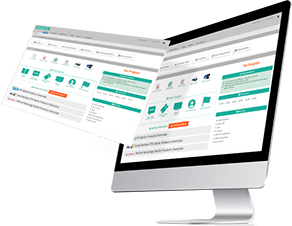Small businesses often face challenges when tax season comes around. Complex rules, tight deadlines, and endless paperwork often overwhelm them.
As a tax preparer, your support can make all the difference. In this article, we’ll explore the best ways tax preparers can help small businesses get tax-season ready.
What Is Tax Season?
If your clients are new to running their businesses or filing taxes, they’ll need to know about tax season. Tax season is when companies prepare their tax returns to avoid late penalties.
The traditional tax season is from the end of January to April 15. That’s when individual tax returns are due. However, for companies, it depends on the type of business, the tax year, and whether they file for an extension.
Clients need to pay quarterly taxes more often. Most businesses pay estimated taxes four times a year. These payments are due on April 15, June 15, September 15, and January 15.
Payroll taxes are for businesses with employees. Your clients need to file these all year long, covering federal, state, and local taxes.
Even though we call it tax season when we file most returns, business owners should be planning and organizing for taxes all year.
9 Ways To Support Small Businesses During Tax Season
1. Organize Financial Records and Past Returns
The IRS requires businesses to keep past returns and proof of deductions for at least three years. Small businesses need to stay on top of this to avoid issues. Talk to your clients about record-keeping—make sure they keep everything organized and accessible. Suggest they save all documents proving income or deductions.
Important items include credit card receipts, bank deposit slips, gross receipts, and bank statements. Remind them that keeping these records longer than the minimum three years can be beneficial.
2. Know Common Tax Deductions and Regulatory Changes
New regulations have influenced tax rules in recent years and added more eligible deductions for business owners. Keep up with regulatory changes to help your clients. Inform small business clients about applicable tax deductions.
If they run their business from home, they can use the home office deduction. This lets them deduct part of their repairs, utilities, rent, and mortgage. Other deductions include QBI, business loans, self-employment tax, insurance, supplies, and even startup costs for their first year.
3. Advise a Tax Strategy for Charitable Contributions
Encourage clients to donate to charities. Many small business owners don’t realize that charitable contributions can significantly lower taxable income. Help them set up a charitable giving plan. Document all donations and ensure they qualify for deductions.
4. Separate Personal and Business Expenses
Small business owners often mix personal and business expenses, which can complicate tax filing. Advise your clients to keep these expenses separate by using dedicated business bank accounts and credit cards. Recommend they document every transaction clearly and maintain receipts for all business-related purchases.
You can suggest they use accounting software like QuickBooks, FreshBooks, or Xero to manage their finances. These tools help track expenses, generate reports, and simplify the process of keeping personal and business finances distinct.
5. Optimize Their Business Structure
Many small businesses stick with their original structure, yet changing it could reduce tax bills. Check if switching from a sole proprietorship to an S-corporation might offer benefits. It can save money and provide legal protections.
To help your clients, explain the potential advantages of different structures. Point out how some setups might lower their tax burden. Recommend consulting a tax professional to decide the best structure for their situation.
6. Remind Them About Payroll Deductions
Tell your small business clients to set aside cash for payroll taxes. This means they need to report, withhold, and pay employment taxes. Employers cover half of Social Security tax (6.2%) and Medicare tax (1.45%). Federal income tax depends on the employee’s salary and expenses.
Recommend payroll software to help them out. These tools track employee hours, calculate taxes, and keep everything compliant. Remind clients to set aside money regularly for these taxes to avoid penalties.
7. Recommend Using Bonus Depreciation
Bonus depreciation lets businesses spread out the cost of pricey equipment over time. For example, if a business buys a $50,000 security system, they can write off $5,000 each year. No limit on bonus depreciation means even future taxable income can be offset.
As a tax preparer, tell your clients to keep track of big purchases. Show them how spreading out deductions can help manage their taxes better. Point out which assets qualify and why it matters. This method helps with cash flow and reduces tax bills.
8. See If They Are Eligible for Qualified Business Income Deduction
The QBI deduction offers a 20% tax break on qualified business income, which can lower taxable income. Factors like income level, service type, assets owned, and wages paid can affect eligibility. Currently, the income limit for single filers is $191,950, and for joint filers, it’s $383,900.
Help your clients see if they qualify for the QBI deduction. Check their income and business setup. Explain the benefits and how to keep records of wages, income, and assets. Encourage detailed record-keeping to maximize savings on their taxes.
9. Suggest Using Accounting Tax Software
Many small businesses are still using spreadsheets to manage their taxes. This practice is inefficient and can lead to errors. To avoid these issues, advise your clients to start using accounting software. It comes with various features like digital receipt storage, detailed reports, and real-time expense tracking. Clients can also use the software to ensure their tax information is up-to-date and easily shareable with their tax preparers.
Additionally, you can use tax accounting software to help prepare and file your clients’ taxes. If you provide year-round accounting services, you could consider switching to a cloud based tax software for accountants to help keep your clients’ tax-season ready as well.
Conclusion
Tax time can be stressful for small business owners who usually prepare and file taxes on their own. Make this year’s process easier for them by suggesting some of the measures above. With your expertise and support, these businesses should be able to avoid errors and get maximum deductions from their tax filings.






